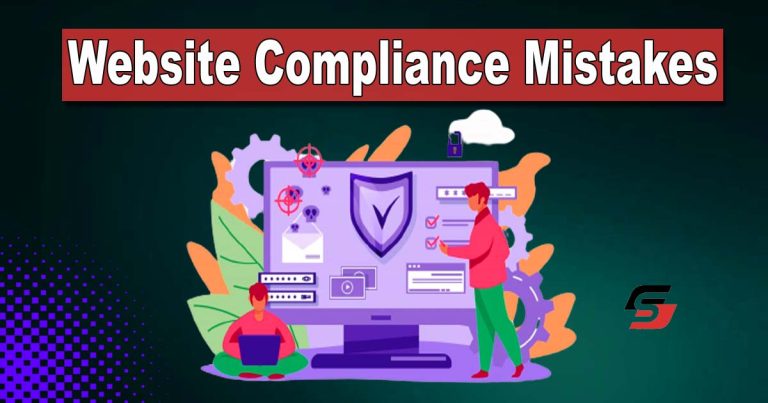Website compliance is important and as 2023 approaches, online companies and website owners need to be aware of the common compliance errors that could seriously harm their reputation. Failure to obey to legal and regulatory requirements can result in penalties, harm to one’s reputation, and a decline in user confidence. So, make sure that your website complies with legal and regulatory requirements, such as accessibility, data protection, and copyright regulations, is known as website compliance. Businesses need to be attentive because non-compliance can have costly impacts.
In this blog post, we have mentioned the common website compliance mistakes to avoid in 2024.
Common Compliance Mistakes
In the under section, we have mentioned the common compliance mistakes:
Lack of Accessibility
Making websites inaccessible to people with damages is one of the most frequent compliance errors. Legal action may be taken since this goes against the Web Content Accessibility Guidelines. AI tools can be instrumental in identifying and repairing accessibility issues. Another common compliance mistake is the failure to regularly update and maintain website content. Outdated information or broken links can negatively impact user experience and can also result in legal consequences. Implementing a content management system and conducting regular audits can help you to assure compliance in this area.
Inadequate Data Privacy Measures
Websites must take data protection seriously because of data breaches and privacy fears. Regulations like the GDPR carry penalties for noncompliance. AI can help in data monitoring, and make sure that sensitive information is appropriately protected. AI can also assist in identifying potential vulnerabilities and proactively addressing them to prevent data breaches. Implementing strong encryption protocols and providing users with clear and transparent privacy policies can further enhance data privacy measures.
Read Also: Reasons Why You Need SEO for Your Website
Copyright Violations
Using copyrighted material without permission is a serious compliance error. AI can help scan websites for copyrighted content and suggest alternatives or request proper permissions, preventing legal complications. AI can support the monitoring of online platforms and the detection of copyright infringement, enabling businesses to respond quickly to protect their intellectual property rights. Businesses may successfully prevent copyright breaches and uphold their legal status in the digital environment by utilizing AI technologies.

Outdated Terms of Service and Privacy Policies
Terms of service and privacy policies need to be updated to reflect any modifications to laws and commercial procedures. To ensure compliance, AI can help with document evaluation and update. In order to spot any inconsistencies or places that require revision, AI technology may analyze and compare the current terms of service and privacy policies with the applicable laws. AI may also automate the process of informing users of any updates or modifications made to these regulations, ensuring accountability and transparency for organizations.
Inaccurate or Misleading Information
Websites must provide accurate and transparent information to users. Misleading claims or false advertising can result in regulatory action. AI can review content and flag inaccuracies. This can help businesses ensure that their websites comply with regulations and avoid potential penalties. Moreover, AI can also analyze user feedback and reviews to identify any instances of misleading information, allowing businesses to promptly address and rectify any issues.

Inadequate Security Measures
Failure to implement proper security measures can lead to data breaches. AI can help identify susceptibilities and recommend security upgrades to protect sensitive data. Additionally, AI can continuously monitor and detect any suspicious activities or unauthorized access attempts, providing businesses with real-time alerts to mitigate potential risks. By proactively addressing security concerns, businesses can safeguard their data and maintain the trust of their customers.
Improper Cookie Consent Management
Websites often use cookies, and it’s essential to obtain user consent. Failing to do so can result in non-compliance with privacy regulations like the GDPR. AI can be employed to manage and monitor cookie consent mechanisms. AI can analyze user behavior and preferences to determine the appropriate level of consent required. It can also automatically update cookie settings based on changes in regulations, ensuring ongoing compliance for businesses.
Lack of Mobile Responsiveness
As mobile device usage continues to rise, websites must be responsive and user-friendly on various screens. AI can assess a website’s responsiveness and suggest improvements. It entails adjusting the layout and style for various screen sizes, speeding up page loads, and increasing user experience all around. AI can continuously track and examine user behavior on mobile devices to spot any problems or potential improvements, ensuring that websites continue to be mobile-friendly and open to all users.
Legal Compliance Updates
Website owners can update their terms of service, privacy policies, and practices by keeping AI informed on changes in laws and regulations. This keeps websites in line with legal regulations and safeguards both website owners and visitors. AI can also assist in automatically generating legally compliant documents, saving time and resources for website owners.
Best Practices for Ensuring Compliance
Regularly audit your website for compliance issues. AI can assist in these audits, making them more efficient and accurate.
- Make sure that your team is well-informed about compliance requirements and how AI tools can be used to maintain compliance.
- Consult with legal experts who specialize in website compliance to ensure that your practices align with the latest regulations.
- Keep up to date with changing compliance regulations and ensure that your website adapts accordingly.
- Prioritize user experience and accessibility when designing or updating your website. AI can help you identify areas for improvement.
The Bottom Line
Website compliance is not an option but a necessity in 2024. Ignoring compliance can lead to legal trouble, damage to your reputation, and a loss of trust from users and directly affect your business and companies’ reputation. By avoiding common compliance mistakes, using AI to detect issues, and following best practices, you can maintain a compliant and trustworthy online presence.



1 Comment
Pingback: How UK fast Withdrawals Work?